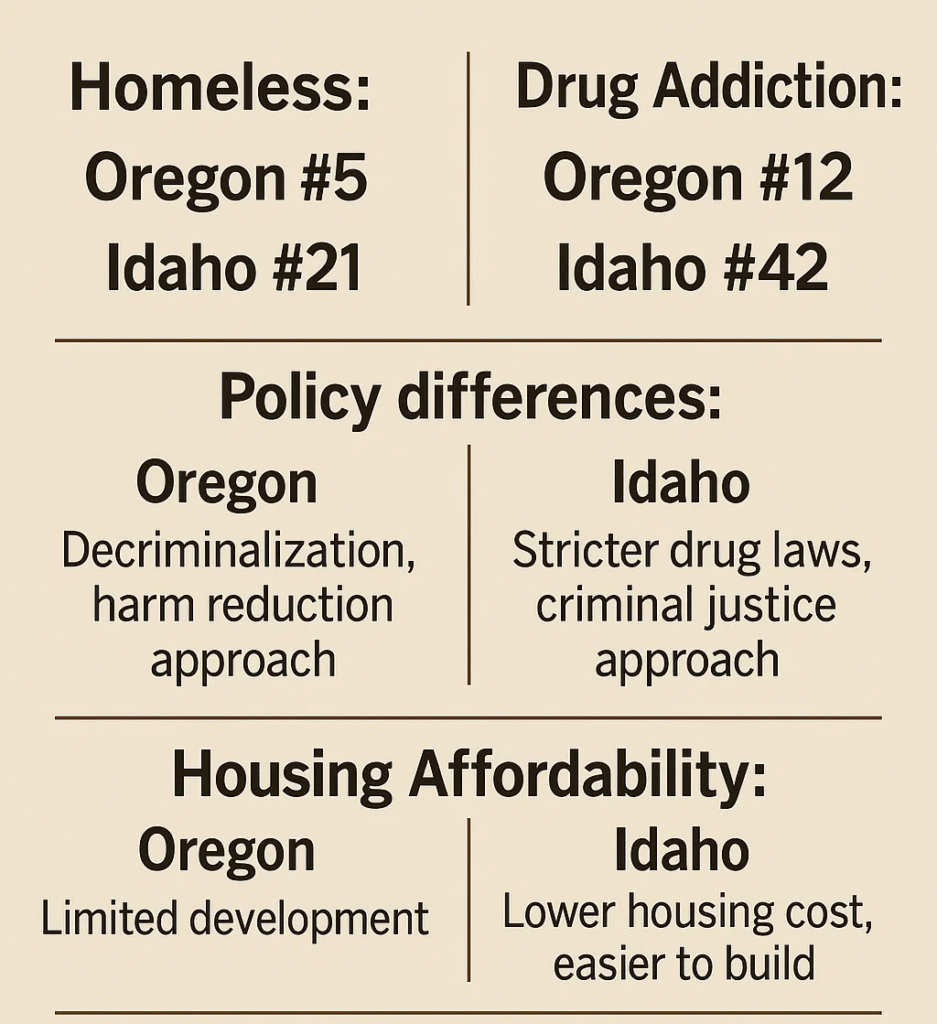What separates Oregon from Idaho when it comes to homelessness and drug addiction? After all, Oregon and Idaho are neighboring states. Yet Oregon ranks among the highest in both homelessness and drug addiction, while Idaho ranks near the bottom in both categories. Despite their close proximity, these two states show a stark contrast in these critical issues.
Homeless:
Oregon #5, Idaho #21 (This is per 10,000 people in 2024)
https://usafacts.org/articles/which-states-have-the-highest-and-lowest-rates-of-homelessness
Drug Addiction:
Oregon #12, Idaho #42 (Overall Rank)
Oregon #3, Idaho #39 (Drug Use Addiction Rank)
https://wallethub.com/edu/drug-use-by-state/35150
What are the primary differences between Oregon and Idaho that might explain these differences in homelessness and drug addiction:
Policy differences:
Oregon: Decriminalization (1), harm reduction approach
Idaho: Stricter drug laws, criminal justice approach
Housing Affordability:
Oregon: Limited development (3)
Idaho: Lower housing cost, easier to build
Oregon state law HB3115 hampers cities from enacting stricter homeless regulations. It is designed to put cities in the cross hair of lawsuits by the homeless with the use of “Objectively Reasonable” in regulating, time, place and manner when regulating homeless polices (2).
Idaho does not have such laws restricting cities from enacting their own policies.
(1) Oregon has repealed the decriminalization of drugs but still has relaxed penalties compared to what it use to be. In addition, the decriminalization most likely has brought in a culture that will take sometime to change.
(2) Background on HB3115 see: Homeless: Understanding State and Federal Law – A Voice Within
(3) Why is Oregon so hard to build affordable housings:
Oregon’s land use laws, particularly Senate Bill 100 passed in 1973, are frequently cited as a significant factor contributing to the difficulty of building housing in the state. This landmark legislation established a comprehensive statewide land-use planning system with the goal of conserving farmland, forests, and natural resources while managing urban development.
* Urban Growth Boundaries: SB 100 mandated that every city and town establish an UGB to control urban sprawl by designating areas suitable for development and preserving surrounding rural lands.
* Exclusive Farm Use and Exclusive Forest Use Zones: A significant portion of private land in Oregon is zoned for exclusive farm or forest use, which severely restricts or prohibits residential development on these properties.
* Strict Land Use Regulations: Oregon’s land use system involves 19 Statewide Planning Goals that local governments must adhere to when creating their comprehensive plans.
If these are the primary reasons why Oregon has such high homeless and drug addiction rates, that suggest there is little we can do at the local level. In other words, Oregon has become an enabling center for these very issues to fester and grow.
What could be done to help at the local level:
Far greater enforcement of our current laws.
Additionally, refuse to build enabling centers/shelters that will house over 4 times the amount of homeless that our local judge states we need to provide for campsite space for. See Homeless Shelter: Say No To Vine St. Homeless Project – A Voice Within
Stayed Tuned for Part II of this series – Oregon versus Idaho: Homelessness and Drug Addiction


